The Poetry Games
by
Greg Pincus
This year the arena is packed to the rafters
With fans cheering loudly for favorite word crafters.
We all have our heroes. We call out their names.
We root and we hoot at the Poetry Games.
Our friends tell us stories of tourneys gone by
When last second sonnets would make the crowds cry.
When two well-versed poets both wrote clerihew…
When strong double dactyls defeated haiku.
Now, this year we listen and hear poets score
With assonance, consonance, slant rhyme and more.
We sigh for a stanza that sends our souls soaring.
We hide as the similes fall like rain pouring.
Crowd favorites emerge from the tales that they tell
In free verse, in ballad, and in villanelle.
A triolet sends one opponent to doom.
Another one drops to a perfect pantoum.
Soon only two stand. We all watch them fight on.
Nobody leaves as they write until dawn.
Then they lay down their pens in this battle of brains…
And a winner is named! Pandemonium reigns!
These Games are a fiction, though here’s what is real:
The power of poems to make us all feel.
Poetry speaks of the world as we know it,
So celebrate words, and go cheer for a poet.
I wrote this poem for Ed DeCaria's March Madness when I had to use the word "pandemonium" (under time pressure, no less). I have to say, it seems like a great poem to run right after National Poetry Month....
If you want to get all my new poems (and only the poems) emailed to you for freeee as they hit the blog, enter your email address in the box below then click subscribe!
Viewing: Blog Posts Tagged with: poem about poetry, Most Recent at Top [Help]
Results 1 - 7 of 7
Blog: GottaBook (Login to Add to MyJacketFlap)
JacketFlap tags: poem about poetry, the hunger games, poem poem, Add a tag
Blog: GottaBook (Login to Add to MyJacketFlap)
JacketFlap tags: poem about writing, poem about poetry, pun poetry, Add a tag
THE POET TALKS BACK
by
Gregory K.
You tire of my puns and jokes?
My meter makes you groan?
You think my rhymes are over-ripe?
My wordplay makes you moan?
There’s little I can say except it really could be worse…
I could become a backwards bard and only write inverse.
I'm posting an original poem each day in April in celebration of National Poetry Month. Links to this and other poems here on GottaBook (and I post all year round, because poetry is NOT just for April!) are collected over on the right of the blog under the headline "The Poems".
If you want to get all my new poems (and only the poems) emailed to you for freeee as they hit the blog, enter your email address in the box below then click subscribe!
Blog: Becky's Book Reviews (Login to Add to MyJacketFlap)
JacketFlap tags: J Historical Fiction, Young Adult Challenge, Young Readers Challenge, A ~ Z Reading Challenge, by the decades challenge, first in a series challenge, Add a tag
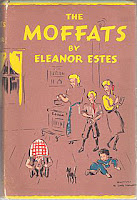
 Estes, Eleanor. 1941. The Moffats.
Estes, Eleanor. 1941. The Moffats.
The Moffats may not be the most exciting, thrilling, page-turning book I've ever read, but it is enjoyable none the less in its quiet, subtle, gentle way. The book focuses on the Moffat family. A mother raising her kids alone. The family is not rich--as you can imagine--but there is a loving, caring atmosphere that makes for a very happy home. The book is episodic. The narrator or main character changes from chapter to chapter. And there is no one connecting plot that threads them altogether. (Well, maybe that isn't quite true. If there is such a plot it would be that their landlord has put their house up for sale. This occurs in the first or second chapter. And the house is sold and the Moffats have to move in the last chapter.) Each chapter is a story of sorts about what life is like--daily life around the house, around school, around town, etc. The stories are mostly lighthearted and fun. But there are some serious moments as well, some moments that border on being a lesson in morality. For readers looking for family-oriented, family-friending reading material, The Moffats is sure to satisfy.
First sentences: The way Mama could peel apples! A few turns of the knife and there the apple was, all skinned! Jane could not take her eyes from her mother's hands. They had a way of doing things, peeling apples, sprinkling salt, counting pennies, that fascinated her.
224 pages
Blog: Becky's Book Reviews (Login to Add to MyJacketFlap)
JacketFlap tags: friendship, war, YA Historical Fiction, Jewish, international literature, Travel the World, Jewish Literature Challenge, Young Adult Challenge, Printz Award Challenge, A ~ Z Reading Challenge, Add a tag
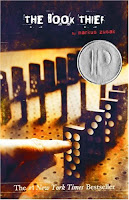
Zusak, Markus. 2006. The Book Thief.
The Book Thief may just be the hardest book I've ever tried to review. It is beautiful. Though it can be ugly. It is intense. It is powerful. It is memorable. The first thing you should know about The Book Thief? It is narrated by Death. This is fitting in many ways since the setting is Nazi Germany during the Second World War. Death is the narrator, and he never lets you forget it. But there are many players--many characters--in the story that Death is relating to his audience all these years later. One of them is a girl, Liesel, and is known by Death as 'the book thief.' These thefts provide some structure to the text. (The structure is one of the odd things about the Book Thief. It isn't chronological. Death doesn't tell a story traditionally. He has his own way of jazzing it up, arranging it so it suits his needs and purposes.) The language, the style, is unique. I think it is written in such a way that you either really love it or you really don't. (It's written in such a way that you could almost open it to any page, and find a sentence or two or a whole paragraph that you want to just lift out and let resonate with you for a time.)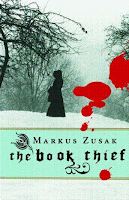 This is how it begins:
This is how it begins:
First the colors. Then the humans. That's usually how I see things. Or at least, how I try. Here is a small fact: you are going to die. I am in all truthfulness attempting to be cheerful about this whole topic, though most people find themselves hindered in believing me, no matter my protestations. Please, trust me. I most definitely can be cheerful. I can be amiable. Agreeable. Affable. And that's only the A's. Just don't ask me to be nice. Nice has nothing to do with me. (3)
It continues:
People observe the colors of a day only at its beginnings and ends, but to me, it's quite clear that a day merges through a multitude of shades and intonations, with each passing moment. A single hour can consist of thousands of different colors. Waxy yellows, cloud-spat blues. Murky darknesses. In my line of work, I make it a point to notice them. As I've been alluding to, my one saving grace is distraction. It keeps me sane. It helps me cope, considering the length of time I've been performing this job. The trouble is, who could ever replace me? Who could step in while I take a break in your stock-standard resort-style vacation destination, whether it be tropical or of the ski trip variety? The answer, of course, is nobody, which has prompted me to make a conscious, deliberate decision--to make distraction my vacation. 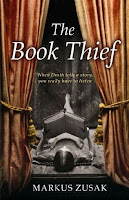 Needless to say, I vacation in increments. In colors. Still it's possible that you might be asking, why does he even need a vacation? What does he need a distraction from? Which brings me to my next point. It's the leftover humans. The survivors. They're the ones I can't stand to look at, although on many occasions I still fail. I deliberately seek out the colors to keep my mind off them, but now and then, I witness the ones who are left behind, crumbling among the jigsaw puzzle of realization, despair, and surprise. They have punctured hearts. They have beaten lungs. Which in turn brings me to the subject I am telling you about tonight, or today, or whatever the hour and color. It's the story of one of those perpetual survivors--an expert at being left behind. It's just a small story really, about, among other things: a girl, some words, an accordionist, some fanatical Germans, a Jewish fish fighter, and quite a lot of thievery. (4-5)
Needless to say, I vacation in increments. In colors. Still it's possible that you might be asking, why does he even need a vacation? What does he need a distraction from? Which brings me to my next point. It's the leftover humans. The survivors. They're the ones I can't stand to look at, although on many occasions I still fail. I deliberately seek out the colors to keep my mind off them, but now and then, I witness the ones who are left behind, crumbling among the jigsaw puzzle of realization, despair, and surprise. They have punctured hearts. They have beaten lungs. Which in turn brings me to the subject I am telling you about tonight, or today, or whatever the hour and color. It's the story of one of those perpetual survivors--an expert at being left behind. It's just a small story really, about, among other things: a girl, some words, an accordionist, some fanatical Germans, a Jewish fish fighter, and quite a lot of thievery. (4-5)
Before the story gets underway, he invites the reader along for the journey:
Yes, often, I am reminded of her, and in one of my vast array of pockets, I have kept her story to retell. It is one of the small legion I carry, each one extraordinary in its own right. Each one an attempt, an immense leap of an attempt--to prove to me that you, and your human existence, are worth it. Here it is. One of a handful. The Book Thief. If you feel like it, come with me. I will tell you a story. I'll show you something. (14-15)
There is depth, substance, to these words, to this story. The descriptions. The details. The powerful sway of the words whether they're describing the beauty of love and family and friendship or capturing the ugly heaviness of hate, anger, and death. It's not an easy story to read. It's full of emotions. It's full of words. It's a book that at it's very heart and soul captures humanity in all its depths--the good, the bad, the ugly. Here is a book that captures what it means to be human.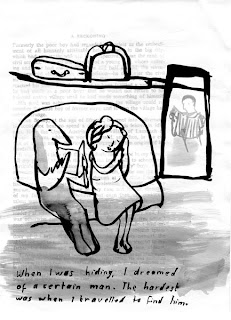 One of the most memorable passages for me (224-236), and I hope this isn't much of a spoiler--is the hand drawn--hand written--portion written by "Max" for Liesel. I find it so powerful in its simplicity. So hauntingly beautiful. There is a second story specially written for Liesel by Max, this second one is found on pps 445-450. This is how that one begins, "There was once a strange, small man. He decided three important details about his life: 1) He would part his hair from the opposite side to everyone else. 2) He would make himself a small, strange mustache. 3) He would one day rule the world." (445)
One of the most memorable passages for me (224-236), and I hope this isn't much of a spoiler--is the hand drawn--hand written--portion written by "Max" for Liesel. I find it so powerful in its simplicity. So hauntingly beautiful. There is a second story specially written for Liesel by Max, this second one is found on pps 445-450. This is how that one begins, "There was once a strange, small man. He decided three important details about his life: 1) He would part his hair from the opposite side to everyone else. 2) He would make himself a small, strange mustache. 3) He would one day rule the world." (445)
Blog: Becky's Book Reviews (Login to Add to MyJacketFlap)
JacketFlap tags: adventure, 2007, J Fiction, J Fantasy, Young Adult Challenge, Speculative Fiction Challenge, Add a tag
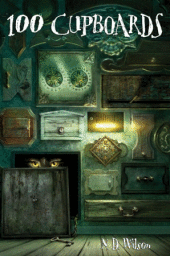
Wilson, N.D. 2007. 100 Cupboards.
I loved Leepike Ridge. Loved, loved, loved it. So when I saw this new author had a second novel coming out, I was very happy. And since I don't have a Random House contact (I would love, love, love a Random House contact), I purchased this one using my Borders bucks. One of the things I loved about Leepike Ridge was the language, the writing. It was bordering on magical the way Wilson's text wrapped itself around you until you were completely captivated.
This is how 100 Cupboards begins:
Henry, Kansas, is a hot town. And a cold town. It is a town so still there are times when you can hear a fly trying to get through the window of the locked-up antique store on Main Street. Nobody remembers who owns the antique store, but if you press your face against the glass, like the fly, you'll see that whoever they are, they don't have much beyond a wide variety of wagon wheels. Yes, Henry is a still town. But there have been tornadoes on Main Street. If the wind blows, it's like it won't ever stop. Once it's stopped, there seems to be no hope of getting it started again. (1)
This is our first introduction to our narrator and hero, Henry:
The Henry on the bus was not a town in Kansas. He was simply a twelve-year-old boy on a slow bus from Boston, waiting to meet an aunt and uncle he had not seen since the age of four. He was not looking forward to reuniting with Aunt Dotty and Uncle Frank. Not because he in any way disliked them, but because he had led a life that had taught him not to look forward to anything. (3)
Henry is an interesting narrator. A strange blend of a disconnected and unemotional boy with an unhappy but wistful longing for change. Does that make any sense? He is very unhappy in some ways; he's been disappointed by people, by things in the past. Yet he can't seem to shake hope as a companion. He's hoping for some simple pleasures. The pleasures of a real family, a real friend. The pleasures of baseball. Henry successfully kept his mind on the game, which might seem strange for a boy who slept beside a wall of magic. But baseball was as magical to him as a green, mossy mountain covered in ancient trees. What's more, baseball was a magic he could run around in and laugh about. While the magic of the cupboards was not necessarily good, the smell of leather mixed with dusty sweat and spitting and running through sparse grass after a small ball couldn't be anything else. (155-6) It is his longing for the ordinary, the simple things of life that provides such strong contrast to his unwillingly stumbling into adventures. Here is a boy who is not seeking out adventures, not seeking out magical lands, not seeking the mystical dangers of the unknown.
I hope I haven't confused you. Henry, our hero, is visiting his aunt and uncle and cousins. His parents were kidnapped. But Henry is unconcerned. (Which in itself is disturbing in a way to most readers. But when you think about it, most fantasy heroes just have to shake off their parents anyway to go on a quest. It's not unusual for parents to be long removed from the story either by death or abandonment. So why not kidnapping?) Henry is a visitor, and his room is the attic. His first few nights in the attic are strange to say the least. But things are about to get a whole lot creepier.
When two knobs suddenly poke through the plaster, Henry knows something is up. And try as he may, he can't fight his curiosity. What he discovers are 99 cupboards--most small--four inches in height. With his cousin, Henrietta, the two seem determined to uncover them. But while Henry can uncover them (de-plaster them) without much thought as to what he's uncovering or unsealing when it comes to trying to open them, well, he's a bit more reluctant. But Henrietta will not be easily dissuaded. So the adventures seem determined to find them one way or another. Their curiosity is only increased when they discover two journals kept by their grandfather.
The adventures that follow are purely creepy. The darkness and intensity of the text being broken only slightly with humor now and then. For fans of Coraline by Neil Gaiman, this one will be a sure winner. I can see easily why this book could truly become a favorite with kids (and a few adults that will admit to reading kids books). But in all honesty, this book was WAY too creepy for me. Perhaps my mistake was reading it late at night. I suppose I thought that it wouldn't be as dark and creepy as it was. But it was. It was thoroughly creepy. But I've got to remember, that many readers love creepy. They find creepy and dark delicious.
What I can't deny no matter how creeped out I got, was that N.D. Wilson has a way with words, a way with details, a way with characters.
Here's another review of the novel.
Here's the Random House page dedicated to the novel.
Blog: Becky's Book Reviews (Login to Add to MyJacketFlap)
JacketFlap tags: TBR Reading Challenge, YA Fantasy, YA Romance, Young Adult Challenge, Speculative Fiction Challenge, Winter Reading Challenge, A ~ Z Reading Challenge, 2007, series challenge, Chunkster Challenge, Add a tag
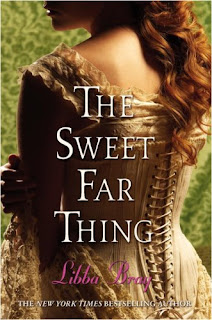
Bray, Libba. 2007. The Sweet Far Thing.
The Sweet Far Thing concludes the trilogy following Gemma Doyle and her quests in and out of the realms. (The first being A Great and Terrible Beauty which I read at least six months or so before I started blogging so there's no record of what I thought. And the second being Rebel Angels which I reviewed last winter/spring.) The book is heavy both in content and weight. 819 pages. Most of them of seventeen-year-old Gemma confused about who she is and what she wants. At the end of Rebel Angels, Gemma bound the magic of the realms to herself. She had promised several different peoples or tribes that she would later share the magic and make peace throughout the realms; she would issue in a new era of peace and unity. The close of Rebel Angels also saw the death of Circe. (or did it???)
The Sweet Far Thing picks up three months later. It is spring. Felicity and Gemma are getting ready to make their debut in society. And Ann, poor Ann, is still going to be a governess. She's still being treated horribly by the other girls at Spence Academy. Mrs. Nightwing is planning a big masked ball in honor of the graduating class--the class of which Gemma and Felicity and Ann are a part. The other buzz around campus is the ongoing work to complete the East Wing. Mrs. Nightwing is determined that the East Wing which was originally destroyed by fire twenty-five years before, needs to be rebuilt in order for Spence to regain its honor and prestige. But there are many people who fear what will happen when the East Wing is rebuilt. They're afraid of what might become unsealed and unburied. The Gypsies. Mother Elena especially is full of warnings. Most of which go unheeded. But such is the way with those that prophesy foreshadowing.
Getting back to Gemma. Gemma was having an identity crisis of sorts in Rebel Angels. She feared that no one really loved her for her. That her father and grandmother and brother all have their own "idea" of who she is. An idea that is far from reality. And she's worried that her friends just love her, just include her because of her magic, because of her power. She was tempted for a while by a boy, Simon, but then felt he didn't love her for her, know her for her either.
This quote is from Rebel Angels:
To Felicity and Ann, I’m a means into the realms.
To Grandmama, I am something to be molded into shape.
To Tom, I am a sister to be endured.
To Father, I am a good girl, always one step away from disappointing him.
To Simon, I’m a mystery.
To Kartik, I am a task he must master.
My refelection stares back at me, waiting for an introduction. Hello, girl in the mirror. You are Gemma Doyle. And I’ve no idea who you really are. (396-397)
Back to Sweet Far Thing. So Gemma is still learning who she is, what she wants, what she needs, and even learning what she fears most. When the book opens, the reader learns that Gemma has not been able to regain access to the realms. She can no longer conjure up the white door. She has seemingly lost her power. Also of note, the dreams and visions have stopped for the most part. But with 819 pages, the reader knows this powerlessness won't last long. Gemma will find a way; she always finds a way to get what she wants or what she thinks she wants.
There is mystery, confusion, epic battles between good and evil, trickery, betrayal, secrets, lies, love and lost love, fear and hope. There is family drama and school drama. And drama between friends as boundaries are pushed or nudged and little lies are told. Fans of the series will no doubt be anxious to read this saga through to its bittersweet conclusion. (I read it in two days.) But I'm unable to predict how they'll feel about the ending. I know my response. (Though I won't go there here in this post.) But how will fans react?
Blog: Becky's Book Reviews (Login to Add to MyJacketFlap)
JacketFlap tags: Reading Challenges, Young Adult Challenge, Add a tag
Hosted by Thoughts of Joy, the goal of the Young Adult challenge is to read twelve young adult books in 2008. I'm not sure which twelve I'll be reading...I'll be reading the 2008 books as well as working on the Cybils at the beginning of the new year. And I'm planning on reading all the 2007 winners and best-ofs as lists come out and awards are announced. So I'll have no trouble coming up with a working list later. Anyway, I'll be joining this one...will give books later. :)



Sounds as good today as it did when you first submitted it following your 36-hour mad writing window.
A great celebration of poetry packed into the poem itself.
Thanks for writing it and sharing it with all of us, Greg.
Greg;
Really enjoyed this!!! Thanks.
Awesome!
"...here’s what is real:
The power of poems to make us all feel."
Right on, Greg. That is exactly it!